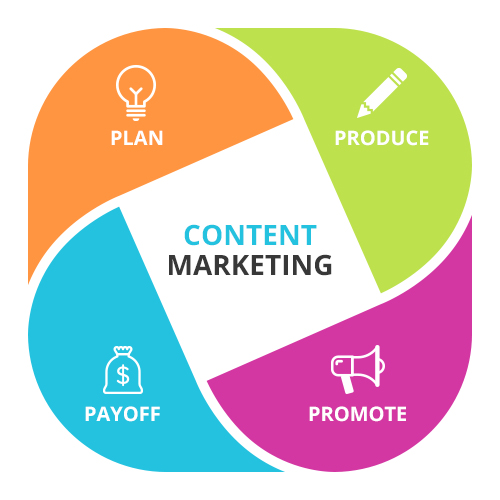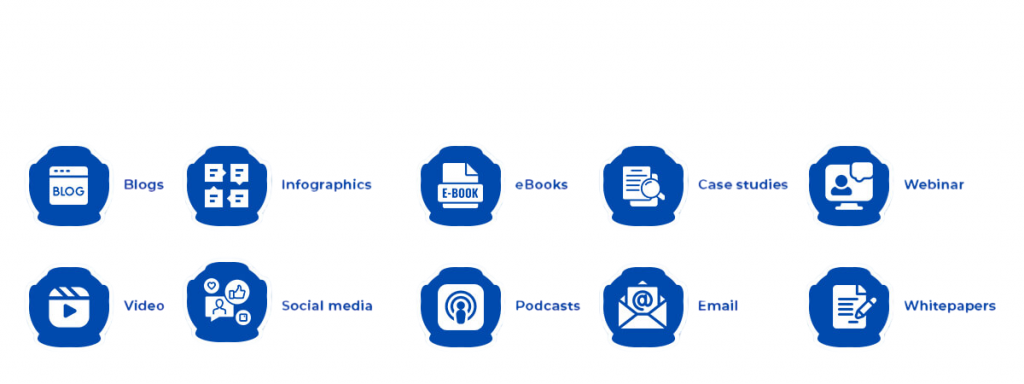
- Introduction
- Definition of Content Marketing
- Why is Content Marketing Important?
- Types of Content Marketing
- The Content Marketing Funnel
- Key Benefits of Content Marketing
- How to Build a Content Marketing Strategy
- Measuring Content Marketing Success
- Conclusion
Introduction
Content marketing is one of the most powerful tools in a modern digital marketer’s toolkit. It allows brands to provide value, build relationships, and influence purchasing decisions without using pushy sales tactics. This guide will help you understand what content marketing is, why it matters, and how to implement it effectively in your business.Content is more than simply words on a page in today’s digital world; it’s a potent instrument that increases engagement, Digital Marketing Training , fosters trust, and leads prospective buyers through each step of the marketing funnel. The deliberate production and dissemination of worthwhile, timely, and consistent material with the goal of drawing in and holding on to a well-defined audience and eventually generating lucrative consumer action is known as content marketing. In contrast to traditional advertising, which frequently disrupts the user experience, content marketing aims to teach, educate, or amuse while offering significant value that gradually captures the interest and allegiance of the audience. Through email campaigns, podcasts, social media, blog posts, and videos, content marketing enables companies to establish themselves as experts in their fields and forge closer bonds with consumers.
Ready to Get Certified in Digital Marketing? Explore the Program Now Digital Marketing Online Training Offered By ACTE Right Now!
Definition of Content Marketing
Content marketing is a strategic marketing approach focused on creating and distributing valuable, relevant, and consistent content to attract and retain a clearly defined audience and ultimately, Digital Marketing Metrics to drive profitable customer action.

Unlike traditional advertising, which interrupts the audience, content marketing provides helpful or entertaining material that draws people in naturally.material marketing is a strategic marketing method that focuses on producing and disseminating consistent, quality, and relevant material in order to draw in and hold on to a well-defined audience and, eventually, encourage profitable consumer behavior. Content marketing seeks to give the audience helpful information that informs, amuses, or resolves a problem rather than overtly advertising a commodity or service. Over time, this helps organizations cultivate leads, raise brand recognition, and turn prospects into devoted customers by establishing credibility and trust.To put it briefly, content marketing aims to increase business growth and long-term consumer engagement by providing the appropriate material to the right people at the right time.
Why is Content Marketing Important?
Content marketing builds trust and credibility by providing solutions to your audience’s problems. In a world saturated with ads, consumers are more likely to engage with brands that educate and inform rather than only promote. Content marketing helps with brand awareness, customer engagement, lead generation, SEO rankings, campaign and nurturing customer loyalty. It supports every stage of the buyer’s journey, Display Advertising from awareness to conversion and retention.Content marketing is crucial because it supports long-term growth by assisting companies in establishing credibility, educating their audience, and fostering meaningful connection. Content marketing provides useful, pertinent material that speaks to the wants and pain areas of customers rather than depending only on direct advertising. By positioning your brand as a helpful authority, this strategy increases the likelihood that consumers will select your goods or services when the time comes to make a purchase. Additionally, it is essential for boosting website traffic, enhancing SEO, and assisting other digital channels like email marketing and social networking. Most significantly, content marketing converts visitors into devoted patrons and advocates by assisting prospective buyers at every point of the buyer’s journey, from awareness to choice.
To Explore Digital Marketing in Depth, Check Out Our Comprehensive Digital Marketing Training To Gain Insights From Our Experts!
Types of Content Marketing
There are many formats of content that marketers can use, each with its own strengths and applications.
- Blog Posts: Blogs are the foundation of most content marketing strategies. They drive organic traffic through search engines, educate readers, Digital Marketing Training and position your brand as an authority in your niche. High-quality blog posts answer questions, solve problems, and encourage user engagement.
- Videos: Video content is highly engaging and widely consumed across platforms. It can include tutorials, product demos, interviews, and behind-the-scenes looks at your brand. Videos increase time spent on page and are highly shareable.
- Infographics: Infographics present complex data or processes in a visually appealing and easy-to-digest format. They are great for improving shareability and understanding of technical or data-heavy content.
- Ebooks and Whitepapers: Long-form content like ebooks and whitepapers is used to provide in-depth information. These formats are commonly gated, meaning users must submit their email to download them. This helps generate leads while offering real value.
- Podcasts: Podcasts are audio content that allows brands to connect with their audience in a more personal and conversational way. They are ideal for building authority and long-form storytelling.
- Social Media Content: Social media platforms offer powerful distribution channels for promoting blog posts, videos, infographics, and short-form updates. Effective social content builds community, sparks conversations, and drives traffic to your owned content.
- Email Newsletters: Email remains one of the highest-ROI content distribution methods. Newsletters keep your audience engaged, promote new content, and nurture subscribers into customers.

The Content Marketing Funnel
- Top of Funnel (Awareness): Create educational and engaging content to attract a broad audience.
- Middle of Funnel (Consideration): Provide solution-oriented content to build trust and nurture leads.
- Bottom of Funnel (Decision): Deliver persuasive content that encourages conversions and sales.
- Post-Purchase (Loyalty/Advocacy): Offer valuable support and incentives to retain customers SEO Keyword Research and inspire referrals.
Looking to Master Digital Marketing? Discover the Digital Marketing Expert Masters Program Training Course Available at ACTE Now!
Key Benefits of Content Marketing
Builds brand awareness by increasing visibility and reach.
- Establishes authority and positions your brand as an industry expert.
- Drives organic traffic through SEO-optimized content.
- Generates and nurtures leads throughout the buyer’s journey.
- Improves customer engagement by providing valuable, relevant content.
- Supports other marketing channels, Click-Through Rate in Digital Marketing like social media and email.
- Increases conversion rates by educating and guiding prospects.
- Builds trust and credibility with your target audience.
- Enhances customer loyalty through ongoing value and support.
- Offers long-term ROI, as quality content continues to deliver results over time.
How to Build a Content Marketing Strategy
- Define Your Goals: Are you aiming for brand awareness, lead generation, or sales?.
- Know Your Audience: Create detailed buyer personas to understand what your audience cares about.
- Choose Content Types and Channels: Based on your audience preferences and business goals.
- Develop a Content Calendar: Plan what content to create, when, and who is responsible.
- Create High-Quality Content: Ensure it is valuable, original, and well-researched.
- Distribute Strategically: Use social media, email, SEO, and paid promotions to amplify reach.
- Measure Performance: Analyze which content is working and refine based on data.
Measuring Content Marketing Success
Measuring the success of Content Marketing Success is essential to understand what’s working, optimize future strategies, and prove ROI. The effectiveness of content can be evaluated through a mix of quantitative and qualitative metrics, depending on the goals of your campaign. Key performance indicators (KPIs) include website traffic, Video content which shows how many users are engaging with your content, and engagement metrics such as time on page, bounce rate, and social shares that reflect content relevance and quality. Lead generation and conversion rates help assess how well your content moves prospects through the marketing funnel. Additionally, SEO Tips To Rule Google Maps metrics like email open rates, click-through rates (CTR), and subscriber growth offer insight into audience interest and retention. For long-term success, it’s also important to measure brand awareness and customer loyalty, which can be tracked through returning visitors, referral traffic, and customer feedback. Tools like Google Analytics, HubSpot, and social media insights can provide the data needed to refine your content strategy and continually improve results.
Preparing for Digital Marketing Job Interviews? Have a Look at Our Blog on Digital Marketing Interview Questions and Answers To Ace Your Interview!
Conclusion
Content marketing is not just a tactic it’s a long-term strategy focused on creating trust and delivering value. By understanding what content marketing is and how it works, businesses can attract the right audience, Video content, convert leads into customers, and build lasting relationships. Whether you’re starting from scratch or looking to improve your existing strategy, mastering content marketing fundamentals is key to long-term digital success.Business success in the fast-paced digital world of today depends on knowing and utilizing the appropriate marketing techniques, from content to funnels to new trends. While content marketing fosters relationships and establishes trust, Digital Marketing Training the digital marketing funnel facilitates the seamless transition of prospects from awareness to loyalty. Keeping up with the most recent developments in digital marketing guarantees that your strategy will always be competitive and current. Businesses may increase their effect, establish a genuine connection with their audience, and promote sustainable growth by regularly assessing performance and making necessary adjustments. Adopting these guidelines puts brands in a strong position to prosper in the ever changing digital market.




